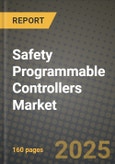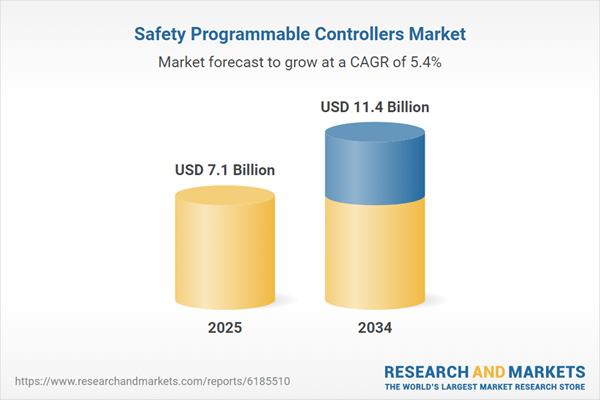The Safety Programmable Controllers market is a key component of the industrial automation and safety landscape, enabling precise control over safety-critical systems in manufacturing, energy, automotive, and processing industries. These controllers are designed to meet stringent safety requirements by ensuring that machinery and equipment operate within safe parameters, quickly executing emergency stops or corrective actions during malfunctions or hazardous conditions. Unlike standard PLCs, safety programmable controllers are certified to meet international standards such as IEC 61508 and ISO 13849, making them essential in high-risk operational environments. Their programmability allows for flexible system designs, making it easier for manufacturers to update or expand safety functions as production requirements evolve. As industries adopt smarter, interconnected systems, the role of safety programmable controllers is evolving beyond basic fail-safes, now integrating diagnostics, redundancy, and network communication features that enhance both safety assurance and operational efficiency.
The Safety Programmable Controllers market saw solid growth due to increased investments in automation and regulatory compliance, especially in high-risk industries like oil & gas, chemicals, and automotive. Manufacturers upgraded legacy systems with modern safety PLCs to meet compliance mandates and reduce liability. The integration of these controllers with advanced industrial communication protocols such as EtherNet/IP and PROFINET enabled centralized monitoring and control, improving responsiveness during safety events. Demand rose for compact and modular safety controllers that could support scalable designs for both small machinery and complex industrial systems. Notably, Asia-Pacific witnessed the fastest market growth, driven by government-supported industrial safety initiatives and infrastructure expansion. In North America and Europe, retrofitting projects and energy sector upgrades created consistent demand. Vendors introduced controllers with built-in cybersecurity features to protect against increasing risks of industrial sabotage and data breaches, while also focusing on user-friendly programming interfaces to simplify adoption for small and mid-sized manufacturers.
The Safety Programmable Controllers market is expected to expand rapidly alongside the global shift toward smart factories and Industry 4.0 principles. The convergence of functional safety and cybersecurity will define product development, with controllers offering real-time system diagnostics, self-checking routines, and secure remote access. Edge computing integration will allow safety logic to be processed closer to equipment, reducing latency and enhancing performance in decentralized environments. Demand will also rise in renewable energy projects, battery storage facilities, and electric vehicle manufacturing, where reliable safety systems are essential. Mid-market companies will increasingly adopt affordable, plug-and-play safety controller solutions, supported by cloud-based lifecycle management and predictive maintenance analytics. Environmental sustainability and energy efficiency will influence controller design, with vendors aiming to reduce power consumption and optimize system integration. As automation deepens in all sectors, safety programmable controllers will remain critical to enabling resilient, adaptive, and regulation-compliant industrial operations.
Key Insights: Safety Programmable Controllers Market
- Edge-integrated safety controllers are emerging to support real-time, decentralized safety logic in high-speed and distributed manufacturing environments.
- Integration of cybersecurity protocols within safety controllers is becoming standard to defend against rising threats in connected industrial systems.
- Compact and modular controller designs are in demand for scalable safety implementations across small, mid-size, and large industrial setups.
- User-friendly programming interfaces and drag-and-drop configuration tools are improving accessibility for non-specialist engineers and smaller firms.
- Cloud-enabled diagnostics and lifecycle management tools are gaining traction for continuous monitoring, testing, and performance optimization of safety systems.
- Stringent safety regulations across manufacturing, energy, and transportation sectors are requiring certified programmable controllers to ensure compliance and reduce operational risk.
- Rising automation and use of robotics in hazardous environments are increasing the need for flexible, programmable safety control systems.
- Industry 4.0 initiatives are driving integration of safety functions into smart, connected manufacturing systems for centralized control and monitoring.
- Growing incidents of workplace accidents and equipment failures are pushing companies to prioritize safety investments to protect workers and reduce downtime.
- The complexity of integrating safety programmable controllers with legacy equipment and diverse communication standards presents a major challenge, especially for older plants lacking technical expertise or budget for full system overhauls.
Safety Programmable Controllers Market Segmentation
By Type
- Modular
- Compact
- Other Types
By Technology
- Traditional
- Safety
- Hybrid
By Application
- Automotive
- Oil and Gas
- Energy and Power
- Pharmaceutical
- Other Applications
Key Companies Analysed
- Siemens AG
- General Electric Company
- Mistubishi Electric Corporation
- Schneider Electric SE
- Honeywell International Inc.
- ABB Group
- Eaton Corporation
- Emerson Electric Co.
- Rockwell Automation
- Bosch Rexroth AG
- Fuji Electric Co. Ltd.
- Omron Corporation
- Keyence Corporation
- Phoenix Contact GmbH & Co. KG
- Yokogawa Electric Corporation
- Sick AG
- Advantech Co. Ltd.
- WAGO
- Beckhoff Automation GmbH & Co. KG
- Hans Turck GmbH & Co. KG
- B&R Industrial Automation GmbH
- Banner Engineering Corp.
- IDEC Corporation
- Pilz GmbH & Co. KG
- Leuze electronic Pvt. Ltd.
- Treotham Automation Pty Ltd.
Safety Programmable Controllers Market Analytics
The report employs rigorous tools, including Porter’s Five Forces, value chain mapping, and scenario-based modeling, to assess supply-demand dynamics. Cross-sector influences from parent, derived, and substitute markets are evaluated to identify risks and opportunities. Trade and pricing analytics provide an up-to-date view of international flows, including leading exporters, importers, and regional price trends.Macroeconomic indicators, policy frameworks such as carbon pricing and energy security strategies, and evolving consumer behavior are considered in forecasting scenarios. Recent deal flows, partnerships, and technology innovations are incorporated to assess their impact on future market performance.
Safety Programmable Controllers Market Competitive Intelligence
The competitive landscape is mapped through proprietary frameworks, profiling leading companies with details on business models, product portfolios, financial performance, and strategic initiatives. Key developments such as mergers & acquisitions, technology collaborations, investment inflows, and regional expansions are analyzed for their competitive impact. The report also identifies emerging players and innovative startups contributing to market disruption.Regional insights highlight the most promising investment destinations, regulatory landscapes, and evolving partnerships across energy and industrial corridors.
Countries Covered
- North America - Safety Programmable Controllers market data and outlook to 2034
- United States
- Canada
- Mexico
- Europe - Safety Programmable Controllers market data and outlook to 2034
- Germany
- United Kingdom
- France
- Italy
- Spain
- BeNeLux
- Russia
- Sweden
- Asia-Pacific - Safety Programmable Controllers market data and outlook to 2034
- China
- Japan
- India
- South Korea
- Australia
- Indonesia
- Malaysia
- Vietnam
- Middle East and Africa - Safety Programmable Controllers market data and outlook to 2034
- Saudi Arabia
- South Africa
- Iran
- UAE
- Egypt
- South and Central America - Safety Programmable Controllers market data and outlook to 2034
- Brazil
- Argentina
- Chile
- Peru
Research Methodology
This study combines primary inputs from industry experts across the Safety Programmable Controllers value chain with secondary data from associations, government publications, trade databases, and company disclosures. Proprietary modeling techniques, including data triangulation, statistical correlation, and scenario planning, are applied to deliver reliable market sizing and forecasting.Key Questions Addressed
- What is the current and forecast market size of the Safety Programmable Controllers industry at global, regional, and country levels?
- Which types, applications, and technologies present the highest growth potential?
- How are supply chains adapting to geopolitical and economic shocks?
- What role do policy frameworks, trade flows, and sustainability targets play in shaping demand?
- Who are the leading players, and how are their strategies evolving in the face of global uncertainty?
- Which regional “hotspots” and customer segments will outpace the market, and what go-to-market and partnership models best support entry and expansion?
- Where are the most investable opportunities - across technology roadmaps, sustainability-linked innovation, and M&A - and what is the best segment to invest over the next 3-5 years?
Your Key Takeaways from the Safety Programmable Controllers Market Report
- Global Safety Programmable Controllers market size and growth projections (CAGR), 2024-2034
- Impact of Russia-Ukraine, Israel-Palestine, and Hamas conflicts on Safety Programmable Controllers trade, costs, and supply chains
- Safety Programmable Controllers market size, share, and outlook across 5 regions and 27 countries, 2023-2034
- Safety Programmable Controllers market size, CAGR, and market share of key products, applications, and end-user verticals, 2023-2034
- Short- and long-term Safety Programmable Controllers market trends, drivers, restraints, and opportunities
- Porter’s Five Forces analysis, technological developments, and Safety Programmable Controllers supply chain analysis
- Safety Programmable Controllers trade analysis, Safety Programmable Controllers market price analysis, and Safety Programmable Controllers supply/demand dynamics
- Profiles of 5 leading companies - overview, key strategies, financials, and products
- Latest Safety Programmable Controllers market news and developments
Additional Support
With the purchase of this report, you will receive:- An updated PDF report and an MS Excel data workbook containing all market tables and figures for easy analysis.
- 7-day post-sale analyst support for clarifications and in-scope supplementary data, ensuring the deliverable aligns precisely with your requirements.
- Complimentary report update to incorporate the latest available data and the impact of recent market developments.
This product will be delivered within 1-3 business days.
Table of Contents
Companies Mentioned
- Siemens AG
- General Electric Company
- Mistubishi Electric Corporation
- Schneider Electric SE
- Honeywell International Inc.
- ABB Group
- Eaton Corporation
- Emerson Electric Co.
- Rockwell Automation
- Bosch Rexroth AG
- Fuji Electric Co. Ltd.
- Omron Corporation
- Keyence Corporation
- Phoenix Contact GmbH & Co. KG
- Yokogawa Electric Corporation
- Sick AG
- Advantech Co. Ltd.
- WAGO
- Beckhoff Automation GmbH & Co. KG
- Hans Turck GmbH & Co. KG
- B&R Industrial Automation GmbH
- Banner Engineering Corp.
- IDEC Corporation
- Pilz GmbH & Co. KG
- Leuze electronic Pvt. Ltd.
- Treotham Automation Pty Ltd.
Table Information
| Report Attribute | Details |
|---|---|
| No. of Pages | 160 |
| Published | October 2025 |
| Forecast Period | 2025 - 2034 |
| Estimated Market Value ( USD | $ 7.1 Billion |
| Forecasted Market Value ( USD | $ 11.4 Billion |
| Compound Annual Growth Rate | 5.3% |
| Regions Covered | Global |
| No. of Companies Mentioned | 26 |









